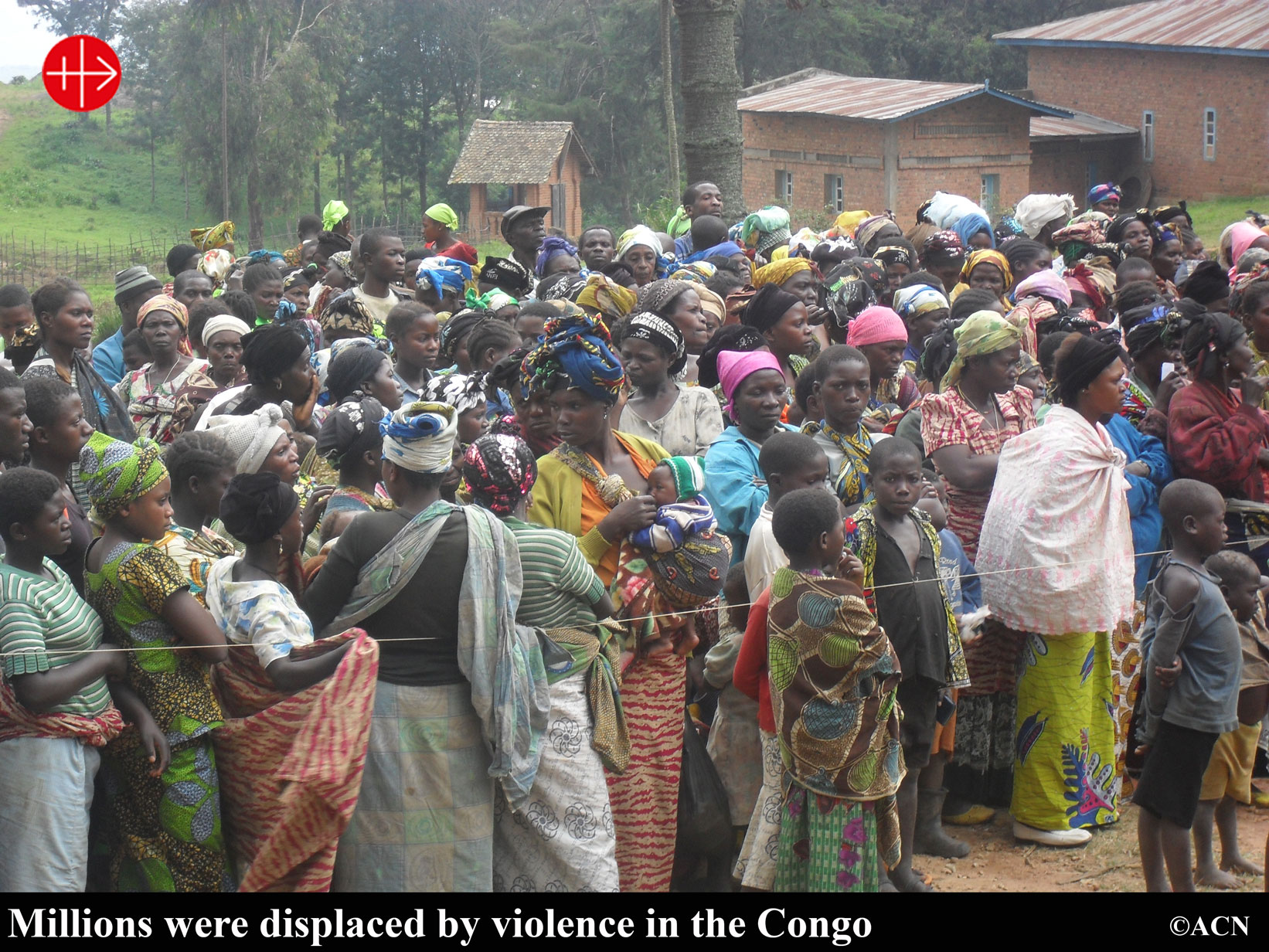DEMOCRATIC REPUBLIC OF CONGO
12 million war casualties in the battle over natural resources
The priest Father Apollinaire Cibaka Cikongo: “Your country may be hell. But it is still your country. It is not easy to be a priest in the Congo. We draw our strength from God and the faith.”
A ravaged, exhausted, devastated nation. “The Democratic Republic of the Congo is a huge country that is frequented by various other countries to gain access to ore deposits as cheaply as possible. That is how they justify the wars.” In these explicit and compelling terms, Father Apollinaire Cibaka Cikongo describes the situation in the second largest country of Africa in an interview with the pontifical foundation Aid to the Church in Need (ACN).
There are a number of reasons why the former Belgian Congo is not able to recover. The ethnic conflicts, the widespread poverty, the never-ending wars, a government that does not want to hold elections even though its last term of office ended more than a year ago, the unceasing flood of refugees. Worldwide, The Democratic Republic of the Congo is one of the countries with the largest refugee populations. According to UNHCR (the UN Refugee Agency), more than 4.5 million internally displaced persons live in the Congo and 735,000 people have fled to neighbouring countries.
But why is not more being said about this? This is the question that Father Apollinaire cannot stop asking himself as he draws attention to the more than 12 million victims of war – a higher number of casualties than in any of the other terrible wars that are currently being waged in other countries. “It is 500 times worse here than in Syria,” he exclaims before forcefully asserting, “The silence follows the bidding of concrete interests. The economic interest in the ore deposits is stronger than all of this.”
“Now that there has been an outbreak of Ebola, The Congo has found its way back into the news. However: why is no one mentioning the war casualties? All losses are of course terrible, but 40 to 50 people may die during an Ebola outbreak. The geopolitical wars have cost the lives of more than 12 million people in my country. Hundreds of children are dying of hunger,” he continues. “God is crying in my country. That is where you have to go to dry His tears.”
The Democratic Republic of the Congo is a poor country but one with very rich deposits of ore. However, these riches have always been its greatest curse. “The war that began in Rwanda and spread to The Congo in 1994 was all about control over the ore deposits. Because in geological terms, The Congo is a veritable treasure trove: most of the ones that are needed by countries all over the world can be found here. If our political leadership had been good, then we would have been able to live very well,” the Congolese priest laments during the interview.
Against the backdrop of this earthly hell, the Catholic Church is one of the few to break the silence. It has denounced the political situation and has come to the aid of those most in need of assistance. Not only the Congolese bishops and priests but also lay people have called for help, often at the cost of reprisals. Father Apollinaire talks about the most recent protests that took place early this year. In response, the police closed churches. “People died, but almost no one talks about this. You have to draw attention to the tragedies that take place in The Congo.”
Father Apollinaire admits that he has repeatedly feared for his life. One such incident occurred in February 2017, when rebels destroyed the seminary and 77 priests in training were forced to quickly flee. They only survived because they found refuge elsewhere. The army occupied the building for four months. However, he also remembers the good things, for example, that the seminary could be reopened months after the attack thanks to national and international support from ACN and other organisations. “None of the seminarians gave up his vocation. In fact, they were joined by eleven more candidates, so that 88 seminarians are now living there.”
“We draw our strength from God, from the faith. However, despite everything, we have not lost our faith in humanity – despite the atrocities, it is capable of. Your country may be hell, but it is still your country,” he concludes.
Unconditional support
Father Apollinaire Cibaka Kikongo studied philosophy and theology in Spain. He talks about meeting very generous people who helped support the Congo financially. “Begging for aid is part of my work. We cannot stop. We cannot simply sit back and do nothing, because people would die without help. We unceasingly ask God, we unceasingly ask people to help our people.”
He admits that, just as in many other places, the life of a priest in The Congo is not easy. The priest lives under the same conditions as the general population. “There are many difficulties: hunger, thirst, dangers. As priest and shepherd, you cannot think of yourself. You have to think of others.” This is why, if “someone chooses to enter the seminary instead of going to university and leading a better life, we accept him. We appreciate him because of the things he is going to do without. We pray that they will become saintly priests, witnesses of Christ’s love in the lives of others.”





